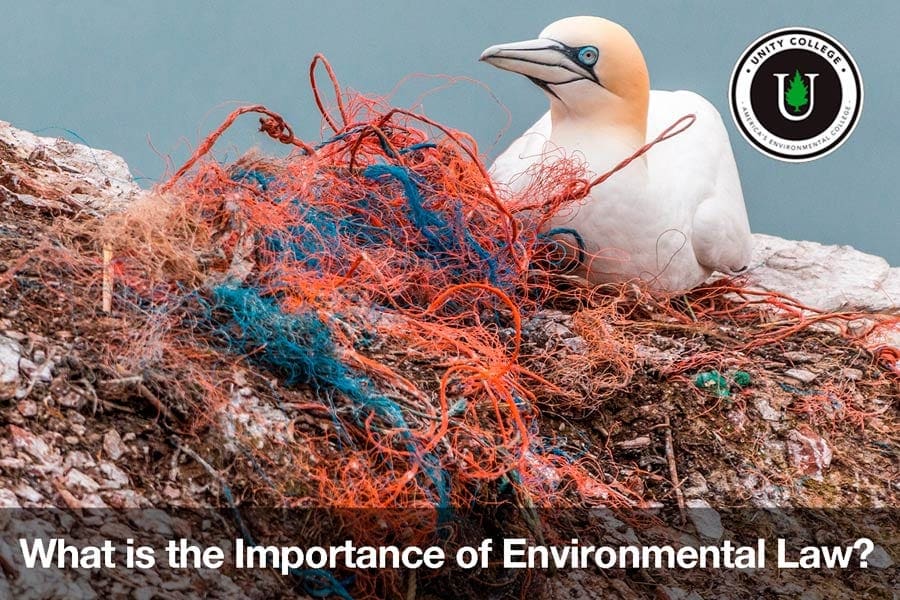Environmental law describes a network of regulations and customary laws that address the effects of human activity on the natural environment. These laws are also referred to as environmental and natural resource laws and center on the idea of environmental pollution.
In addition to this issue, environmental law works to manage specific natural resources and environmental impact assessment.
There are a few key areas that environmental law works to regulate in order to lessen the impact on the environment. Some of these areas include:
- Air Quality
- Water Quality
- Waste Management
- Contaminant Cleanup
- Chemical Safety
- Resource Sustainability
Why is Environmental Law Important?
As you can see from the list above, environmental laws play a huge part in protecting humans, animals, resources, and habitats. Without these laws, there would be no regulations concerning pollution, contamination, hunting, or even response to disasters.
Environmental law works to protect land, air, water, and soil. Negligence of these laws results in various punishments like fines, community service, and in some extreme cases, jail time. Without these environmental laws, the government would not be able to punish those who treat the environment poorly.
3 Environmental Law Degrees
There are many ways that you can get involved with environmental law. Whether you are interested in developing policies or enforcing them, there is a place for you in this field.
1. Environmental Criminal Justice Degree
You may know that you can acquire a degree in criminal justice, but did you know you can specify that degree and earn your online environmental criminal justice degree?
What this means is that you can get a formal education that teaches you how to protect and serve both your community and the environment. A degree in environmental criminal justice gives you knowledge of a combination of criminal law, law enforcement, and environmental studies.
Throughout this education, you learn about law, psychology, environmental studies, sustainability, political science, and more. With a degree from this program, you will be prepared to take on a position with the U.S. National Park Service, Fish and Wildlife Service, and a myriad of other federal agencies.
This field is growing at a rapid pace due to the consistent pollution that is happening all over our world and it is estimated that from 2016 to 2026, there will be an 11% increase in employment opportunities. The demand for environmental specialists within not only government buildings, but also to consult businesses regarding their practices and how to decrease their pollution is on a consistent, upwards climb. This industry is one that will continue to expand as our world becomes more in tune with climate change and the effects that humans have on the environment.
2. Environmental Policy, Law, and Society Degree
If enforcement isn’t quite the route you’d like to take, but you still want to have an impact on environmental law, you may want to look into getting an environmental law bachelor’s degree.
When studying this discipline, you will not only learn about the environment and its laws, but you’ll gain valuable knowledge concerning advocacy, ethics, and American democracy. You can learn about state and local governments as well as natural resource law and policy.
All of these components come together and allow you to find a career as a lawyer, policymaker, grant writer, or non-profit leader, all within the environmental science industry. You can make a difference within policy and law, rather than enforcement.
3. Conservation Law Enforcement Degree
A bachelor’s degree in conservation law enforcement gives you a well-rounded educational experience that opens you up to opportunities involving resource management and environmental protection.
Throughout your education, you’ll learn vital skills like crime scene investigation, policy procedures and search warrants, interviews and interrogations, and surveillance techniques all coupled with knowledge of environmental science and studies.
Careers associated with this degree include a wide variety of options like forest rangers, marine patrols, game wardens, and jobs within the Bureau of Land Management. This education path is a great choice for someone who wants to actively defend this Earth’s resources and make a difference.
Game Wardens: A Common Career Path for People with Environmental Law Degrees
A qualified game warden is someone who has dedicated their career to keeping natural resources safe from humans as well as protecting humans and animals during outdoor recreational activities.
These activities include things like fishing and hunting.
Not only are game wardens protectors of nature, but they are also environmental law enforces. They are committed to hard work and have a special dedication to both humans and animals and their protection. Game wardens have to enforce specific laws, but they also need to lead by example.
Game wardens should have or acquire sound knowledge of law and government, biology, sociology, public safety, geography, and customer service. A combination of these skills allows a game warden to perform their necessary daily tasks.
Their daily tasks can include patrols by car, boat, airplane, horse, or on foot. They should interact with people participating in outdoor activities to enforce and make clear laws for fishing, hunting, boating, etc. The median annual wage for a game warden is $56,410 but depends based on the state in which you live. The states with the highest demand for game and fish wardens are Texas, New York, and California.
Additionally, game wardens compile evidence, make arrests and serve warrants, promote safety, and participate in search and rescue missions. There are many other responsibilities bestowed upon game wardens, and you can find a more comprehensive list here that includes tasks, skills, and university courses necessary for a game warden to become the best they can be.
The Bottom Line
Environmental law sounds like a complicated establishment of policies and procedures, but the truth is that anyone can learn more about it and become involved with the proper education. As stated earlier, the environmental science industry is on a rapid increase with employment opportunities flourishing as more people become aware of the situation at hand. This job stability, brought on by the fact that we are continuing to pollute the world, is exactly why high school students should be considering environmental science as their field of study. It is current, ever-changing, and incredibly important to human life.
Degree Programs









